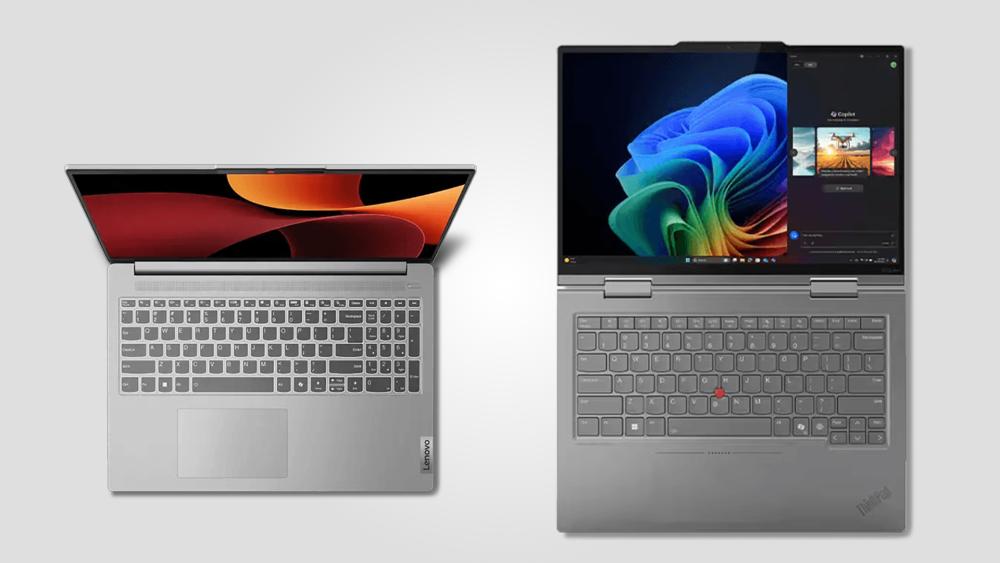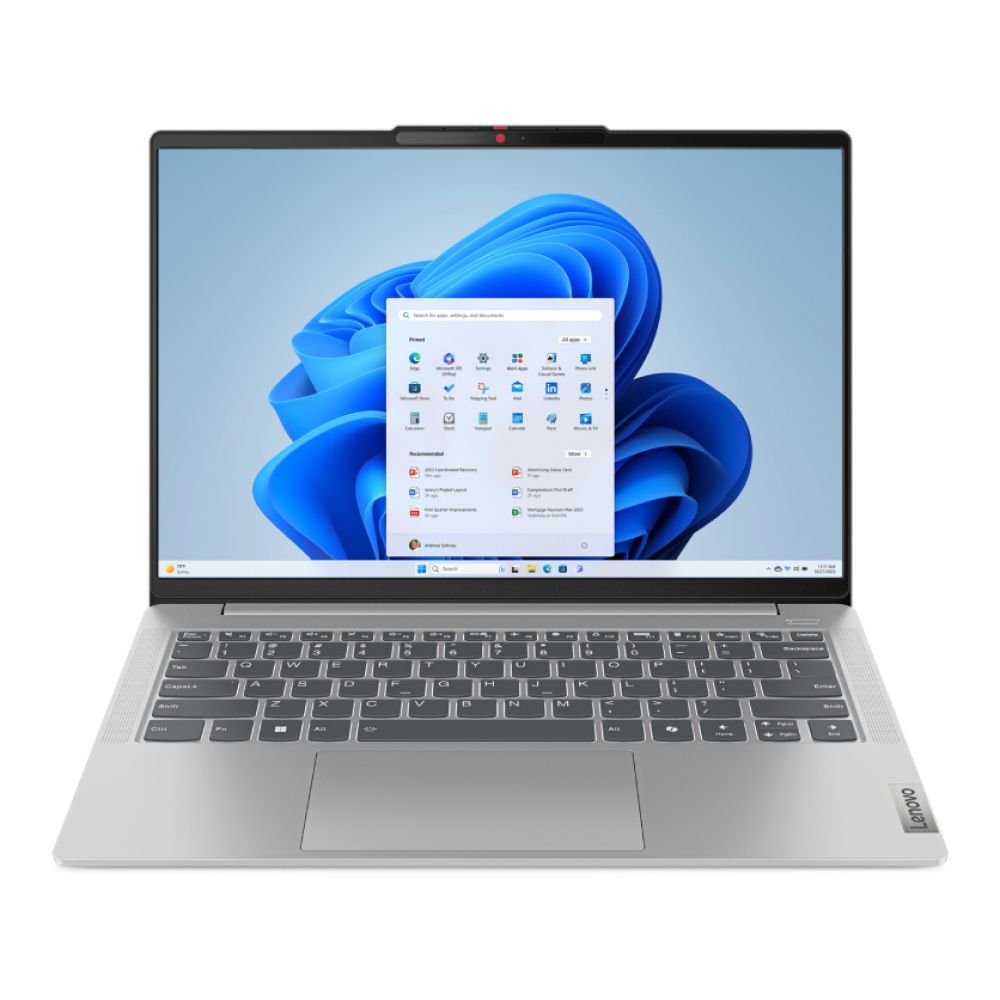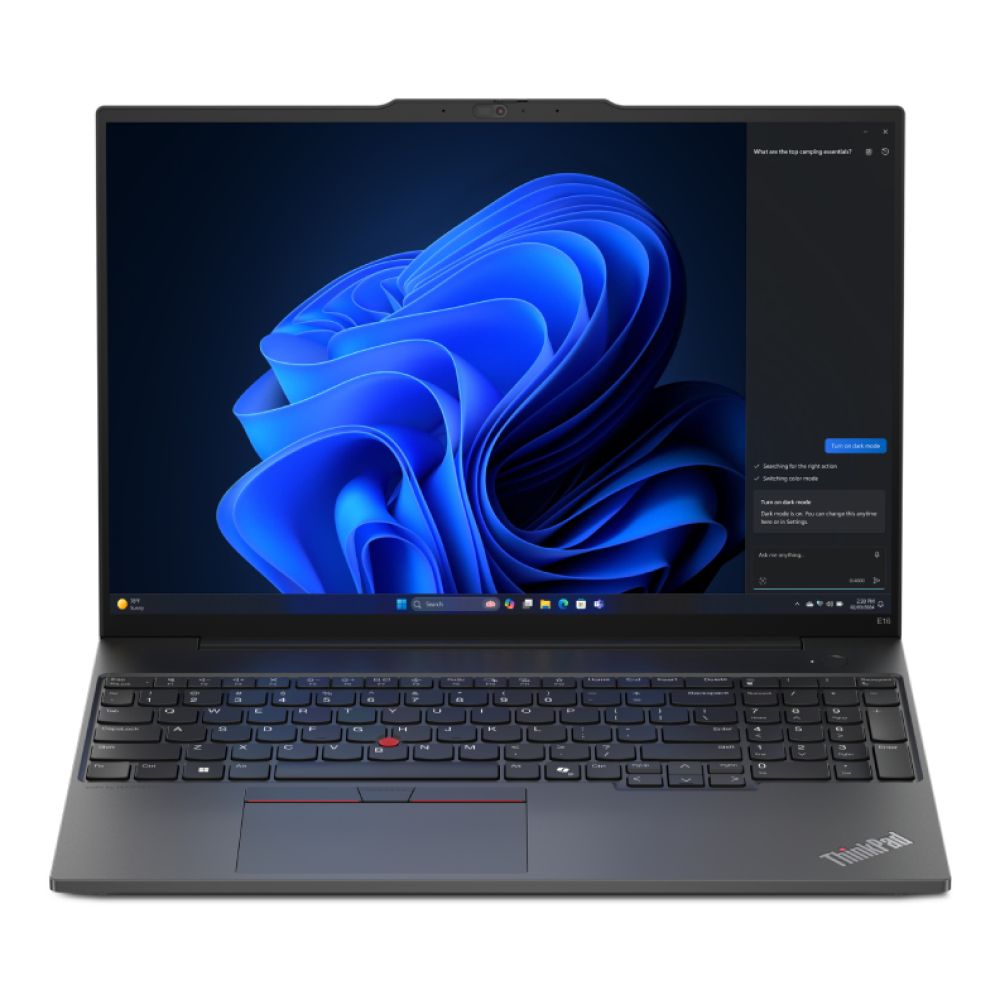POSTED: 20 August, 2025
Lenovo Ideapad vs. ThinkPad: Which is Right for You in 2025?
Lenovo has long been one of the most trusted names in the laptop world, and in 2025, two of its most popular ranges still dominate the conversation: the Lenovo ThinkPad and Ideapad. Both series have their loyal fans, but the real question is which one best suits your needs this year. Whether you’re after a lightweight laptop 2025 for university, a high-end business laptop with enterprise security features, or simply a budget-friendly laptop for everyday browsing, Lenovo offers a strong option in both categories.
The ThinkPad vs Ideapad debate has become more interesting than ever, thanks to major updates in processors, including the arrival of Intel Core Ultra and AMD Ryzen AI Pro chips, not to mention the continued optimisation of Microsoft Windows 11. These improvements have transformed what you can expect in terms of power, efficiency, and AI-driven performance.
In this blog, we’ll compare Ideapad and ThinkPad models across design, portability, battery life, performance, and value for money. By the end, you’ll know exactly which Lenovo device to choose in 2025.
Overview of the Lenovo Ideapad and ThinkPad Lines:
Lenovo has created two distinct families of laptops, each catering to a different audience. The Lenovo ThinkPad lineup has always been synonymous with reliability, productivity, and enterprise security features, making it the go-to choice for professionals, IT departments, and business travellers. With their durable laptop build, rugged testing, and classic black aesthetic, ThinkPads remain a staple in offices across the world.
On the other hand, the latest Lenovo IdeaPad laptops are designed with everyday users and students in mind. They are stylish, slim, and often come as touchscreen laptop 2-in-1 models, making them a versatile choice for study, streaming, or light creative work. As an excellent part of the full range of Lenovo laptops, IdeaPads strike an excellent balance between affordable pricing and modern performance.
So when it comes to Ideapad or ThinkPad, the decision largely depends on your priorities. Do you need the rugged reliability of a professional ThinkPad, or the flexibility and lightweight design of an IdeaPad?
Design and Build Quality:

One of the most noticeable differences in the Lenovo ThinkPad vs Ideapad comparison is their design philosophy.
The ThinkPad range is known for its durable laptop build and rugged reliability. Many models undergo military-grade testing, ensuring they can handle drops, spills, and heavy daily use. Their design leans towards a professional aesthetic, with matte finishes, strong hinges, and excellent keyboard travel distance that makes typing comfortable during long work sessions. The ThinkPad also offers a wide port selection, catering to professionals who need USB-C, HDMI, Ethernet, and docking options.
The IdeaPad, meanwhile, prioritises elegance and portability. These machines often come in slim, stylish chassis that make them ideal lightweight ultrabooks for students and travellers. The reduced weight (often well under 4 lbs, depending on the model) means they’re easy to carry around campus or during commutes. While the port selection is more minimal to achieve that slimmer form factor, the trade-off is an attractive and lightweight laptop design that appeals to casual and educational users.
When weighing ThinkPad vs Ideapad, it comes down to priorities: rugged, professional reliability and connectivity versus slim, portable elegance.
Performance and Processors in 2025:
Performance is where the Lenovo ThinkPad vs Ideapad debate really heats up in 2025. Both lineups benefit from the latest generation of processors, but they’re tuned for different audiences.
ThinkPad laptops are built as high-end business laptops, offering the latest Intel Core Ultra and AMD Ryzen AI Pro processors. These chips bring advanced AI-driven performance, improved energy efficiency, and serious multitasking capabilities. For professionals running complex applications, coding, or data-heavy workflows, the ThinkPad delivers raw power along with options for RAM/SSD upgrade flexibility. Combined with enterprise security features, they’re designed to handle demanding work environments.
IdeaPad models, on the other hand, focus on balancing performance with affordability. Many feature Ryzen AI performance and Intel Core Ultra options, but are configured for general productivity, streaming, and creative work. They’re more than capable for students and everyday users, particularly with Microsoft Windows 11 optimised for AI-assisted tasks. While IdeaPads may not match the ThinkPad for sheer professional horsepower, they offer excellent value for money in the budget-friendly laptop category.
Ultimately, when comparing ThinkPad vs Ideapad in terms of performance, the choice depends on whether you need enterprise-level power and upgradeability, or a cost-effective laptop that handles daily tasks smoothly.
Display and User Experience:

The Lenovo ThinkPad vs Ideapad comparison becomes even clearer when looking at displays and day-to-day usability.
ThinkPad laptops are designed with productivity in mind. Many models offer sharp, colour-accurate screens with anti-glare coatings, making them perfect for professionals who spend hours working on documents, coding, or editing visuals. Display sizes typically range from 14" to 16", with higher-end models including OLED or high-refresh IPS options. Combined with excellent keyboard travel distance and responsive touchpads, the ThinkPad delivers a comfortable, work-oriented experience.
IdeaPad laptops, on the other hand, are tailored for versatility and entertainment. Many of the latest Lenovo IdeaPad laptops feature touchscreen laptop 2-in-1 designs, giving you an interactive display that can fold into tablet mode. This makes them ideal for students who want to take notes, sketch, or stream content on the go. Display size options are varied too, from compact 13" ultraportables to larger 16" screens for immersive viewing.
So when deciding between Ideapad or ThinkPad, ask yourself: do you prioritise a professional, colour-accurate panel for business and creative tasks, or a flexible touchscreen convertible laptop for study and everyday use?
Portability and Battery Life Comparison:
When it comes to Lenovo ThinkPad vs Ideapad, portability and endurance play a massive role in choosing the right device.
The ThinkPad lineup is built for professionals who need reliable uptime. Many models deliver long battery life, often exceeding 12–15 hours depending on usage, making them ideal for business travel and long workdays. However, the trade-off is a slightly bulkier design, with weights starting around 3.5 lbs and going higher for larger 16" models. That said, their rugged build and wider port selection make them a secure choice for road warriors who need to plug into multiple peripherals.
In contrast, the latest Lenovo IdeaPad laptops shine in terms of laptop portability. With sleek designs and lightweight ultrabooks often weighing under 3 lbs, they’re easy to carry in a backpack or handbag. Battery life typically ranges between 8–12 hours, which is more than enough for a day of lectures or casual use, though not quite as extensive as most ThinkPads. The reduced weight and elegant finish make them one of the most appealing choices for anyone seeking a lightweight laptop in 2025.
So if you need rugged, professional endurance, the ThinkPad is a safe bet. If you value slim, portable convenience, the IdeaPad is hard to beat.
Security Features and Business Readiness:
When comparing Lenovo ThinkPad vs Ideapad, security is where the gap really widens.
ThinkPad laptops are designed for business users and IT professionals, offering enterprise-grade protection. Most models include fingerprint scanner security, infrared cameras for facial recognition via Windows Hello, and TPM 2.0 chips for hardware-level encryption. Many ThinkPads also feature the ThinkShutter webcam cover and optional smart card readers, making them compliant with enterprise security standards. Combined with their rugged build quality and BIOS-level protections, ThinkPads remain one of the most secure options on the market for 2025.
IdeaPad laptops, meanwhile, focus more on consumer-friendly features. Some models include a fingerprint scanner or a manual webcam privacy shutter, which are great for everyday users. However, they lack the deeper enterprise security features that businesses demand. For students and home users, this level of security is typically sufficient, especially when paired with the built-in protections of Microsoft Windows 11.
So, when it comes to Ideapad or ThinkPad for professional use, the ThinkPad clearly leads with its professional, secure design. For personal use, the IdeaPad remains a cost-effective choice without overloading users with business-focused extras.
Price Range and Value for Money:
Price is another key factor in the Lenovo ThinkPad vs Ideapad discussion, and it often determines which series buyers ultimately choose.
ThinkPad laptops sit in the high-end business laptop category, with prices reflecting their rugged build, advanced security, and premium hardware. Entry-level ThinkPads generally start from the mid-£700 range and can climb well past £2,000 for top-tier models like the X1 Carbon or workstation-grade ThinkPads equipped with Intel Core Ultra or AMD Ryzen AI Pro chips. For professionals, the higher price range is justified by features such as enterprise security features, superior battery life, and better long-term durability.
IdeaPad laptops, by contrast, are positioned as budget-friendly laptops that still deliver solid performance. Starting at under £400, they offer a wide variety of configurations, from basic notebooks for browsing and study to touchscreen convertible laptops with interactive displays. While they don’t have the same ruggedness or professional-grade components as ThinkPads, IdeaPads provide excellent value, especially for students and casual users who want a lightweight laptop in 2025 without spending too much.
If you’re weighing Ideapad or ThinkPad based on price, the choice is clear: ThinkPads are an investment in professional-grade reliability, while IdeaPads are an affordable yet capable choice for everyday computing. To see the best offers, check out our Lenovo deals section.
Accessories and Ecosystem:
When choosing between Lenovo ThinkPad vs Ideapad, it’s also worth considering the accessories and wider ecosystem that enhance your laptop experience.
For business users, ThinkPad laptops pair seamlessly with docking stations, external monitors, and portable keyboards, turning them into full desktop workstations when needed. They also integrate well with enterprise peripherals, making them ideal for corporate setups.
For students and casual users, IdeaPad laptops work great with affordable add-ons like wireless mice, portable storage, and touchscreen laptop 2-in-1 styluses for note-taking and creative projects.
No matter which series you choose, Lenovo-branded headsets are a strong addition for both professional calls and entertainment, ensuring crystal-clear audio during meetings or gaming. On top of that, Lenovo frequently offers bundles and promotions that you can find at Box.co.uk, making it easy to configure your setup at a better price.
Both the Lenovo ThinkPad lineup and the latest Lenovo IdeaPad laptops benefit from Lenovo’s wide accessory range, allowing you to customise your device for work, study, or play.
Which is Best for Students?

For students, the Lenovo ThinkPad vs Ideapad choice often comes down to balancing affordability, portability, and flexibility.
The latest Lenovo IdeaPad laptops are widely considered the best Lenovo laptops for students because they are lightweight, affordable, and often available as touchscreen convertible laptops. Features like an interactive display, slim design, and lower weight (in lbs) make them ideal for carrying between lectures or using in different study environments. Many models also provide solid battery life for a full day of classes, which is essential for university life.
That said, certain students, especially those studying computer science, engineering, or business, may benefit from the extra power and enterprise security features offered by the Lenovo ThinkPad lineup. With better keyboard travel distance for heavy typing, longer battery life in hours, and durable builds that can withstand years of use, ThinkPads are a long-term investment for demanding academic workloads.
In short, if you want a cost-effective and lightweight laptop in 2025 for note-taking, streaming, and studying, an IdeaPad is the right choice. But if your course requires heavy multitasking, coding, or advanced applications, a ThinkPad may prove more reliable over the long run.
Which is Best for Professionals and Businesses?
When it comes to professional use, the Lenovo ThinkPad vs Ideapad comparison has a clear winner for most business environments.
The Lenovo ThinkPad lineup has been the gold standard for companies for decades. With enterprise security features such as fingerprint scanner security, TPM encryption, and smart card support, ThinkPads are built to handle sensitive data and corporate IT requirements. Their durable laptop build, long battery life in hours, and wide port selection make them dependable for frequent travel and hybrid working setups. For executives, IT professionals, and anyone requiring a high-end business laptop, ThinkPads remain the trusted option.
That said, the latest Lenovo IdeaPad laptops still hold appeal for freelancers, small business owners, or professionals who prioritise lightweight ultrabooks at a lower cost. They’re particularly well-suited for presentations, video calls, and general productivity, especially when paired with Lenovo-branded headsets for clear communication. However, they don’t offer the same rugged reliability or enterprise security features as ThinkPads.
In short, if your career demands maximum reliability, security, and long-term durability, a ThinkPad is the clear recommendation. If you’re running a smaller setup or just want a budget-friendly laptop that balances performance with portability, an IdeaPad can still be a smart purchase.
Final Verdict: Ideapad or ThinkPad in 2025?
After looking at performance, portability, design, security, and value, the Lenovo ThinkPad vs Ideapad decision comes down to what you need most in 2025.
- Choose the Lenovo IdeaPad if you want a lightweight laptop for 2025 that’s affordable, stylish, and versatile. Ideal for students, casual users, and those who prefer touchscreen convertible laptops, the latest Lenovo IdeaPad laptops strike the right balance between cost and functionality.
- Choose the Lenovo ThinkPad if you need a high-end business laptop with a durable build, long battery life, and enterprise security features. The Lenovo ThinkPad lineup is perfect for professionals, IT specialists, and anyone who values reliability and long-term durability over sleekness.
Ultimately, Lenovo has something for everyone, which you can check out in our full range of Lenovo laptops. Whichever side of the ThinkPad vs Ideapad debate you fall on, both series deliver quality, innovation, and the latest tech, whether powered by Intel Core Ultra or AMD Ryzen AI Pro.
FAQs - Lenovo Thinkpad vs Ideapad:
1. Which is better: Lenovo ThinkPad or IdeaPad?
It depends on your needs. The Lenovo ThinkPad vs Ideapad debate boils down to purpose: ThinkPads are ideal for professionals who need a durable laptop build, enterprise-grade security, and long battery life, while IdeaPads are better for students and casual users who want a budget-friendly laptop with portability and touchscreen 2-in-1 options.
2. Is the Lenovo IdeaPad good for students in 2025?
Yes, the latest Lenovo IdeaPad laptops are among the best Lenovo laptops for students. They’re lightweight, affordable, and often include interactive displays, making them great for studying, note-taking, and streaming.
3. Do ThinkPads have better battery life than IdeaPads?
Generally, yes. Many Lenovo ThinkPad lineup models exceed 12–15 hours of battery life, with some business laptops lasting over 20 hours. IdeaPads are more portable, but their battery life usually averages 8–12 hours, depending on the model.
4. Are Lenovo ThinkPads still the best business laptops?
Absolutely. ThinkPads remain a top choice for companies due to their enterprise security features, Intel Core Ultra or AMD Ryzen AI Pro processors, and rugged durability. They’re widely regarded as some of the best high-end business laptops in 2025.
5. Does Lenovo IdeaPad support touchscreen and 2-in-1 features?
Yes, many IdeaPad models come as touchscreen convertible laptops with flexible hinges, letting you use them as tablets. This makes them especially popular with students and casual users who want an interactive display.


